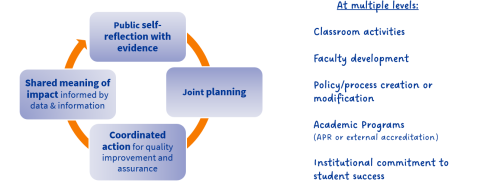External Accreditation Support
Request a consultation and/or support with external accreditation
UNH's regional accreditor, the New England Commission of Higher Education (NECHE)
- Status: Accredited by NECHE
- Overview of NECHE accreditation and process in affirming our commitment to the NECHE standards
- changes that merit a substantive change approval from NECHE
Program Licensure Disclosure Information at UNH by program
Program Specific External Accreditation
- Tips for writing an external accreditation self-study
- Tips for organizing an external accreditation site visit
- List of UNH academic programs that are externally accredited
Academic Compliance
See the 5 priorities for Academic year 2024-25 can be found by visiting: UNH's Academic Compliance Hub on the E3 SharePoint site.
Academic Program Assessment
Resources, templates, and examples can be found: Assessment Hub on the E3 SharePoint site.
The Educational Excellence and Effectiveness (E3) team coordinates cycles of inquiry and assessment efforts across the university to support individual groups while also the mission of UNH to achieve high-quality education, and commitment to research and community outreach. Promoting future-focused strategy and continuous assessment that enables UNH to continuously strengthen and also demonstrate the value of higher education to our students and society.
To achieve this, in partnership with the community, the Educational Excellence and Effectiveness team seeks to:
1. Support and expand the practice of evidence-informed self-reflection with a willingness to accept and act on needed change. Encourage all strategic and assessment planning to commit to continuously advancing and develop.

2. Create conditions where high-quality data and information are readily available to give evidence to 1) our assumptions, 2) needed change, 3) assessing the impact of changes, and 4) inspirations for future focused planning. This includes fostering awareness, ensuring access, and encouraging the use of data/information across UNH campuses.
3. Promote an integrated and aligned approach to educational excellence and effectiveness that is strengthened by a community that shares localized resources to solve common goals and challenges.
• Avoid Duplication: Prevent redundant efforts by avoiding data, information, and communication silos. When these are isolated, successes remain hidden. Instead, promote and amplify achievements and best practices.
• Common Data Metrics: Advocate for common data metrics that are regularly reviewed and accessible to everyone. Having shared metrics ensures consistency and transparency.
• Holistic Assessment: Enable an integrated approach to assessing the impact of various experiences on student success and overall student experience. Consider the whole picture rather than isolated elements.
• Collective Support: Facilitate ongoing discussions among stakeholders on how best to support student success for all students. Collaboration leads to better outcomes.
